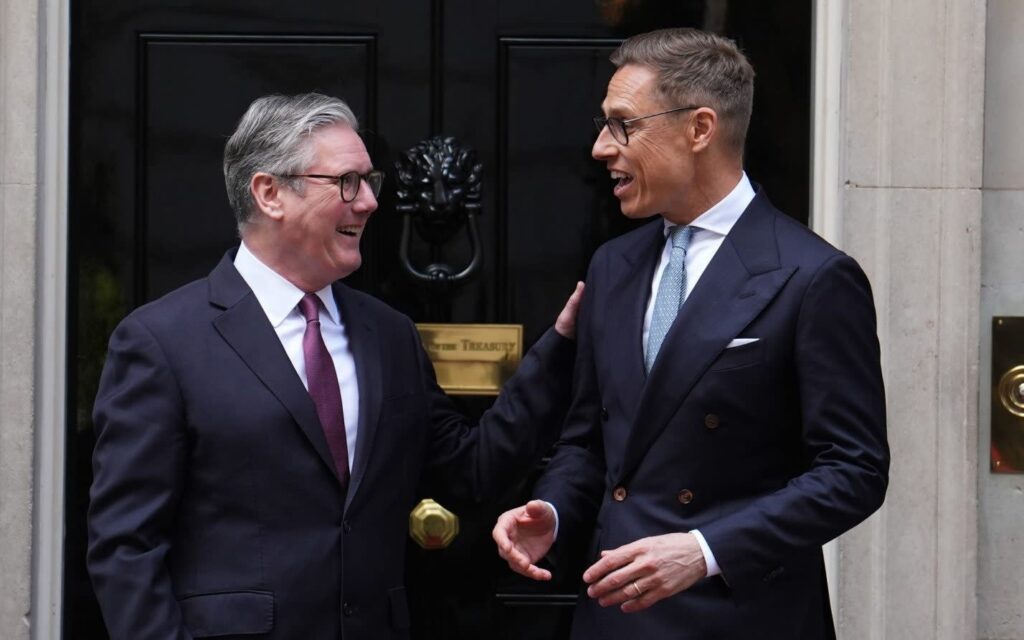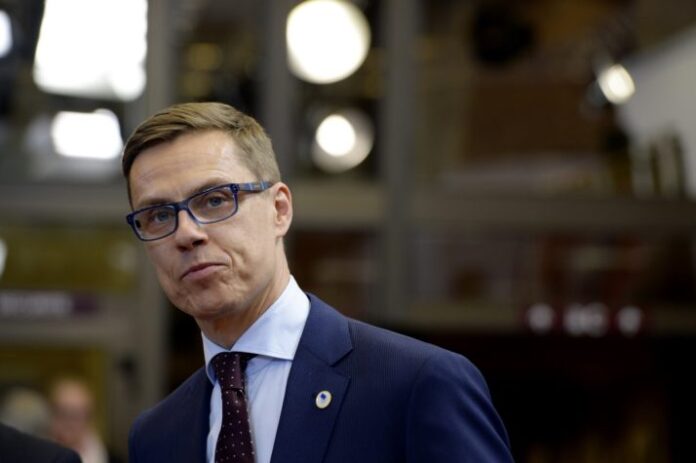The president of Finland is towering, lean and athletic and holds a doctorate from the London School of Economics. So I am not entirely convinced when Alexander Stubb tells me that he is struggling “to put sentences together” after an overnight flight from Florida and a day spent with Donald Trump.
Sure enough, Stubb has lost none of his verbal fluency as he describes his encounter with America’s president, and how it has left him guardedly optimistic about the next moves in Ukraine and the strength of the Atlantic alliance.

Instead of fretting about Trump, Stubb believes that Europeans should “calm down, take a nice bath, take a sauna, take a deep breath” and “engage rather than disengage”. He is in town presumably to pass on just that message to Sir Keir Starmer.

Stubb’s advice is worth listening to. Back home, he leads a country fated by geography to engage with a deeply threatening neighbour. Finland has Europe’s longest border with Russia – running for 830 miles through a vista of pine forests and frozen lakes – and only 5.6 million people, barely 4 per cent of Vladimir Putin’s 144 million subjects.
Despite that perilous combination and a bitter history of 30 Russo-Finnish wars, the frontier remains quiet and Finns sleep soundly in their beds; in fact, their country has been ranked the happiest in the world in 2025 – for the eighth year running.
As I go to meet him at his London hotel, I want to discover how Finland has managed to crack the problem of living alongside Russia without being invaded. Now that Putin is forcing every European country to study this conundrum, what can Europe learn from Finland?
As he greets me, Stubb introduces himself as “Alex” but throughout our conversation I feel more comfortable calling him “Mr President”. Behind his oval glasses, cheery demeanour and diplomatic finesse, there is steel and determination.
He is quick to describe his meeting this weekend with Trump. He went to see the American on his home ground: Mar-a-Lago estate in Florida. “I had the opportunity to spend almost the whole day with the president,” says Stubb. “We had breakfast, we played a round of golf and then we had lunch afterwards. A good opportunity to get to know each other, to socialise, and then discuss a little bit of shop.”
On this mission, Stubb had one key advantage. As a young man, he was a prodigiously talented golfer, so much so that he secured a golf scholarship at Furman University in South Carolina. “When I was young, I had a dream of becoming a golf professional – that’s why I went to study in the US,” he recalls. “But I quickly learnt that I wasn’t good enough.”
His abilities may not have run to turning professional, but they were good enough to put the US president in a fine mood.
“Just played a round of golf with Alexander Stubb, President of Finland,” Trump noted on his Truth Social account. “He is a very good player, and we won the Men’s Member-Guest Golf Tournament at Trump International Golf Club.”
“We did our best and did well,” was Stubb’s modest summary of an evidently successful bit of “golf diplomacy”.
But if, by Trump’s account, the golf was a joint triumph for Finland and America, what about the diplomacy? Is Trump now listening to Europe on Ukraine?
“I think so,” replies Stubb, “and mainly because he has close connections with Prime Minister Starmer and [French] President Macron. At the same time, I have a sense that time is running out for Russia. There is this sense of urgency on the American side. Remember that the Americans brokered an overall ceasefire which was accepted by the Ukrainians and the Europeans – but then not accepted by the Russians.”
On March 11, Ukraine accepted an unconditional 30-day ceasefire and Marco Rubio, the US secretary of state, declared: “The ball is now in Russia’s court.” Yet Putin responded by proposing a far narrower ceasefire, limited to energy infrastructure and Black Sea shipping, and only if new conditions were met.
Stubb believes that Russian intransigence is now registering with the US. “I think we’re very much in a situation whereby the Americans are running out of patience with Putin for understandable reasons and I think that’s good news for the peace process.”
I ask how America should respond if and when Putin exhausts their patience. “What we need is a very clear deadline for a full ceasefire,” replies Stubb. “In my mind it would be useful to have it on April 20, when President Trump’s second term has been in force for three months and it’s Easter.
“If that ceasefire is either not accepted by the Russians, or broken by the Russians, then there should be colossal sanctions coming from both the United States and from Europe because the only thing that Russia understands is power. I think many of our American friends are starting to see that as well.”
What sanctions would he recommend? “I’m not going to give any advice to the United States except look at the sanctions which will be put forward by Senator Lindsey Graham in the Senate next week,” replies Stubb.
Graham, a Republican from South Carolina, is expected to propose a bill containing what he calls “bone-breaking sanctions” on Russia. As for what those measures might include, Trump said on Sunday that if Russia failed to make a deal on “stopping the bloodshed in Ukraine” and “if I think it was Russia’s fault” then: “I am going to put secondary tariffs on oil, on all oil coming out of Russia.” This probably means that America would try to cripple Russian oil sales by imposing punitive tariffs on any importing country.

